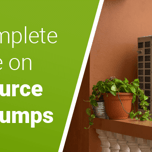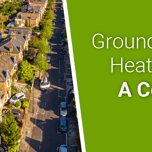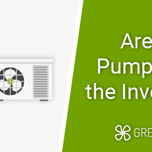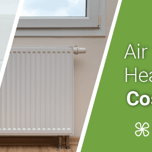
Get up to 4 quotes by filling in only 1 quick form

Slash your energy bills by installing a heat pump

We’ve helped over 500,000 homeowners reduce their carbon footprint
- GreenMatch
- Air Source Heat Pumps
- Air to Water Heat Pumps
Air to Water Heat Pump in the UK (Updated 2024 Guide)
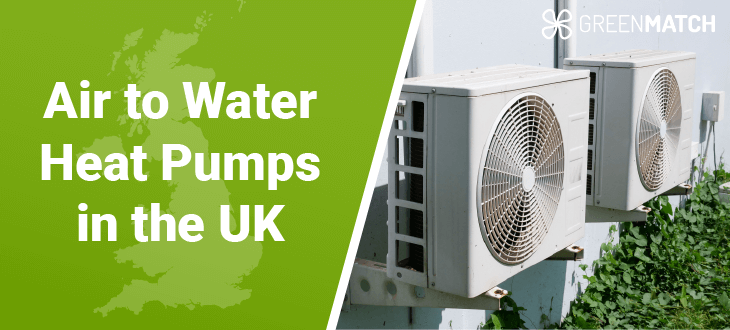
Air-to-water heat pumps are becoming increasingly popular in the UK due to escalating demand for low-carbon and cost-effective heating solutions. With their ability to harness ambient air and transform it into a reliable source of warmth, this type of air source heat pump has become a reliable choice for homeowners seeking low-carbon, energy-efficient heating options.
By 2028, the UK expects to be installing 600,000 heat pumps every year – making it clear that heat pumps are here to stay and that the advantages of air to water heat pumps will only get better. Homes in moderate climates and equipped with proper insulation will see the most benefits when it comes to switching to an air source heat pump.
In this 2024 guide, we’ll explore the ins and outs of the best air to water heat pumps in the UK, delving into their benefits, financial aid, installation considerations and how they last eco-conscious households for years to come.
Ready to take control of your heating costs and reduce your carbon footprint? By connecting with our qualified partner installers, you’ll unlock the secrets of air to water heat pumps and the potential savings they offer. Our experts will evaluate your property, taking into account factors such as climate and insulation, to provide you with up to 3 tailored quotes.
With this valuable information, you can choose the installer that offers the most competitive quote and highest quality, that way you know you’re getting the best deal without risk of overpaying. All of the quotes you receive are free and come with no obligation, so there’s no risk to being more sustainable. Start getting your quotes today by clicking the button below.
- Quotes from local engineers
- Payment by finance available
- Save up to £1100 per year
It only takes 30 seconds



- Air to Water Heat Pump in the UK (Updated 2024 Guide)
- How does an air to water heat pump work?
- How efficient are air to water heat pumps?
- Is a domestic air source heat pump expensive to run?
- Are there air to water heat pump grants?
- Advantages and disadvantages of air to water systems
- 4 Factors to consider when installing air source heat pumps
- Maintenance and care for optimal performance
- FAQ about air to water heat pumps
What is an air to water heat pump?
An air to water heat pump is a heating system that transfers heat from the outside air into a water storage tank, which can then be pumped into radiators or underfloor heating. It is a highly efficient source of central heating as well as hot water for taps, showers, and baths.
It works similarly to an air to air source heat pump but adds additional components, such as a hot water tank, that allow it to use water as a conduit for the heat. This difference in the heating process makes it more suitable for tasks like underfloor heating and lets the heat pump provide hot water, unlike its air to air source counterpart.
How does an air to water heat pump work?
Air to water heat pumps take heat from the outside air and transfer it to a wet central heating system, usually through radiators or underfloor heating. The created heat can be used for space heating or as a hot water supply for the house. Air to water heat pumps are among the most efficient air source heat pumps on the market. Their efficiency can go as high as 400% depending on the conditions, but usually, you can expect at least 200% efficiency.
The inner workings of an air to water heat pump can be complicated but, in essence, it begins with the outdoor unit, which absorbs heat from the surrounding air. This collected heat is then transferred to a coolant inside the system. To further increase its temperature, a compressor comes into play.
Once the coolant is sufficiently heated, it passes through a heat exchanger, where it releases its heat to a hot water reserve tank. This hot water is then circulated throughout the house, supplying warmth to radiators and faucets. As the hot water is utilised, it returns to the reserve tank as cold water.
Simultaneously, the coolant, now cooled by the water, makes its way back to the outdoor unit, ready to repeat the heating process. With this continuous cycle, the air to water heat pump efficiently provides the necessary warmth to keep your home cosy and comfortable.
This type of heat pump works best in moderate climates. Keeping the working principles of an air to water heat pump in mind, the decline in temperatures will affect the operating efficiency. An air to water heat pump can work in temperatures between -20°C and 20°C, but will work most optimally at 7°C. In climates with very low winter temperatures, ground source heat pumps are a more suitable choice as they extract heat from the ground.
Choosing the right heat pump depends on the needs of the house. Air to water heat pumps in the UK are predominantly used in retrofit projects, where they have gained popularity due to their compatibility with existing heating systems. However, their versatility extends beyond retrofits, making them an excellent choice for new-build properties as well.
The International Energy Agency, in their latest special report, stresses that no new gas boilers should be sold after 2025 if Net Zero targets need to be achieved by 2050. Heat pumps are expected to be a better, low-carbon alternative to heating homes in the foreseeable future.
Heat pumps play a vital role in the UK’s goal to reach Net Zero by 2050, and an additional 27 million heat pumps are expected to be installed by then. Of all heat pumps installed, air source heat pumps are the most popular in the UK, accounting for approximately 96% of installations.
With the implementation of the heat and buildings strategy, it is expected to reduce the cost of air to water heat pumps in the UK by at least 25-50% by 2025 and further increase the installation of various heat pumps as a low-carbon heating solution.
If you’re still wondering how an air source heat pump works, we’ve made a quick video to answer your questions.

Are you still unsure if an air to water heat pump is right for you? A qualified heat pump installer can help advise you on whether a heat pump installation is the right choice for you. They’ll evaluate your home based on your current infrastructure, insulation, and heating demands and provide you with a quote. In fact, we highly recommend getting multiple quotes so that you’re able to compare them and choose the best one.
Luckily, GreenMatch can help you with that. We understand that heat pumps are the future and we want to help as many homes as possible make a smooth transition at the best possible price. We’ve built a network of qualified partner heat pump installers across the UK that can offer you the most competitive quotes for the highest quality installation.
If you’re interested in installing a heat pump, we’ll match you with up to 3 of the best heat pump installers that fit your needs. You can then compare their quotes and choose the best one. That way you know you’re getting a heat pump that fits your home and your wallet. This quote service is completely free and non-binding!
- Quotes from local engineers
- Payment by finance available
- Save up to £1100 per year
It only takes 30 seconds



How efficient are air to water heat pumps?
By using an air to water heat pump in the UK, you are reducing your annual carbon emissions by up to 2800 kg of CO2. That’s equivalent to using over 1000 litres of petrol! This is because it produces more heat than the amount of electricity it uses.
In fact, an air to water heat pump has an efficiency of 200%-400%, also known as having a coefficient of performance (COP) of 2 to 4. This means it can produce up to 4 times the amount of electricity it uses. It does this by capturing low-grade air and transferring it within the system to generate optimal heating and hot water for your home. The bottom line is that as long as your heat pump has a COP above 1, then you’re producing more heat energy than the electrical energy you’re consuming.
The diagram below illustrates how a 9-kilowatt (kW) heat pump works and helps us calculate its COP. In this example, the heat pump consumes 3kW of electricity and produces a heat output of 9kW. You’ll notice that the remaining 6kW comes from the ambient air outside.
To calculate the COP, we divide the heat output by the electrical input. In this case, the COP is 3, which tells us that for every unit of electricity used, the heat pump generates three units of heat. This demonstrates the efficiency and effectiveness of the heat pump system.
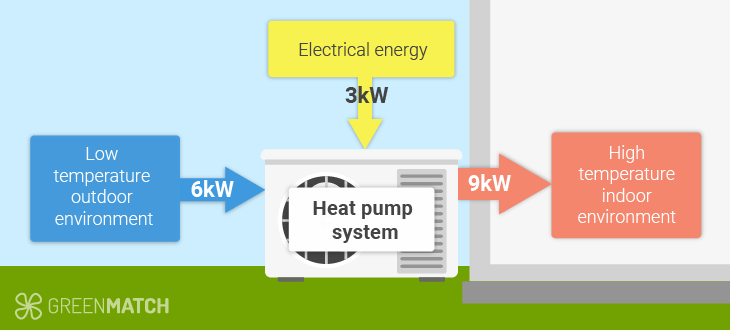
Careful planning is essential for obtaining the best value for money when it comes to an air source heat pump installation, regardless of whether it is for a renovation or new construction.
Air to water heat pumps work very well with underfloor heating, as they operate at lower temperatures. Initially, the costs of underfloor heating systems combined with a heat pump can seem like a significant investment. However, within the first year of installation, you will be able to see the differences with lower electricity bills, and increased comfort in your property. Depending on your system and location, you could be paying off your heat pump within 12 years.
Air to water heat pumps can also be considered if you use radiators with your existing heating system. If you don’t want to upgrade to underfloor heating, it’s worth noting that the efficiency of the heat pump combined with radiators will depend on them being properly sized for the heating demand. Larger size or double-panel radiators will be most suitable in this case.
If you want to learn more about the heat pump efficiency, you can check out the video below. In it, we compare air to water heat pumps against air to air heat pumps based on not only their efficiency, but also installation costs and the possible savings you can make with them.

Is a domestic air source heat pump expensive to run?
The upfront price of an air to water heat pump is around £8,000-£18,000, including the system and installation price. You will still need to consider the running costs of your air source heat pump. There are several main factors to consider that will affect your annual running cost.
- Size of the property
- Property insulation quality
- Heating demand
- Heat pump efficiency
- Maintenance and labour costs
- Government grants
The running cost will vary per house. It’s important to emphasise that your house needs good insulation before you think about installing any heat pump, otherwise, you waste money on lost heat.
As an example, if you have a medium-sized home with an annual heat demand of 12,000kW, you could be spending £1,511 per year on running costs – assuming you have a COP of 3 and lose no heat due to poor insulation.
Let’s have a look at a detailed running costs breakdown below.
| Factors | Small home | Medium home | Large home |
|---|---|---|---|
| Annual heat demand | 8,000kW | 12,000kW | 17,000kW |
| Average COP of an ASHP | 3 | ||
| Electricity input required | 2,666kW | 4,000kW | 5,666kW |
| Electricity price (£) | 33.2p / kWh | ||
| Standing charge (£) | 50.4p / day * 365 = £183.96 | ||
| Annual running cost of ASHP | £1,069.29 | £1,511.96 | £2,065.29 |
In comparison, ground source heat pumps have a higher COP that can go up to 5 but they also have higher upfront costs which can be unaffordable to many households. System and installation prices of ground source heat pumps start from around £14,500 and can go up to £40,000. That is one of the main reasons why air source heat pumps are more popular.
One way to save money on air source heat pump running costs is by installing a hybrid heat pump, which combines your heat pump with a gas boiler. Most hybrid heat pumps can automatically switch between the heating systems depending on which is more energy efficient at that time which can help you save money in running costs.
All of the prices you see in this article are based on real averages and should be treated as a guideline only. Your exact costs will vary and only a professional heat pump installer will be able to provide tailored estimates. If you’re considering a heat pump and want to know how much it will cost you, we can help you get started by getting up to 3 reliable quotes from professional installers in your area.
By receiving multiple quotes, you can compare and select the most favourable deal. This free service speeds up the process of finding an installer by helping you skip hours of repetitive research and removes the need for second guessing yourself as you’ll have the advice of an expert. The best part is that you’re not obliged to accept any of the quotes, so the decision is entirely up to you.
- Quotes from local engineers
- Payment by finance available
- Save up to £1100 per year
It only takes 30 seconds



Are there air to water heat pump grants?
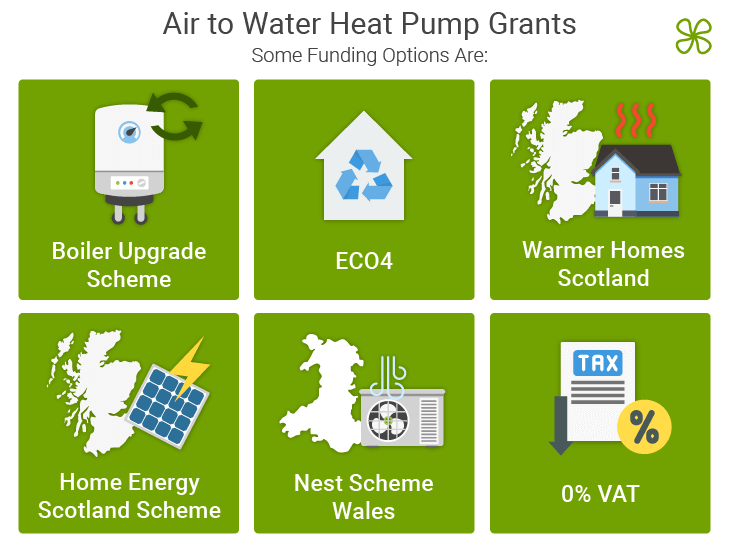
In short, yes. Depending on where you live, you could be eligible to apply for a heat pump grant that covers up to 100% of the upfront costs of air to water heat pumps. Different grants have different eligibility requirements that could depend on your income, benefits, location, and energy rating.
The Boiler Upgrade Scheme (BUS) started in April 2022 and replaced the Renewable Heat Incentive (RHI). It helps homeowners fund the upgrade of their current heating system with a low-carbon option. With it, you could receive up to £5,000 for an air to water heat pump.
Another option you have is the Energy Company Obligation 4 (ECO4) scheme which is designed to tackle fuel poverty and help reduce carbon emissions. If you’re eligible, you could get up to 100% of the costs of your air to water heat pump covered. You may also be eligible to improve your loft, cavity, and wall insulation.
There are also country-specific grants, such as the Warmer Homes Scotland scheme, Home Energy Scotland Scheme, and the Nest Scheme Wales. With some of these schemes, you can also receive free advice on your low-carbon options and how to improve your fuel savings.
Additionally, the government has introduced a tax rebate for energy-saving products, which includes air to water heat pumps. If you are installing a covered energy-saving material, then you may be eligible to pay a reduced VAT of 0% on your costs. You can also install other products, such as insulation, at the same time as long as the primary bulk of the work is for the covered energy-saving material.
Advantages and disadvantages of air to water systems
In this section, we will explore the advantages and disadvantages of air to water systems, shedding light on their efficiency, environmental impact, versatility, as well as potential challenges. By understanding the pros and cons, readers will gain valuable insights into whether air to water heat pump cooling and heating is the right choice for their demands.
Overall, careful consideration of the specific needs and climate of your property is necessary to determine whether the advantages of air to water systems outweigh the potential disadvantages.
Advantages of air to water heat pumps
- Well-suited for new-builds as well as retrofits. Installation planning for air to water pumps is easier, as they are smaller and don’t take up a lot of space. If you have radiators or underfloor heating/cooling, then an air to water heat pump may be easily installed retroactively to your home.
- Eligible for government grants. The push for more sustainable heating and green energy options has opened up new grant opportunities for UK homeowners financed by the government.
- Compact and quiet. As suppliers of both heating and cooling, indoor air source heat pump units are often compact and silent. With an average of 60dB, it’s equivalent to the sound of an air conditioner. It’s worth noting that not all heat pumps are compact and it can vary depending on the model and application.
- Family-friendly and safer than combustion-based systems. Due to the fact that air source heat pumps don’t produce carbon monoxide and don’t require gas, they’re often viewed as safer than traditional systems as they reduce the risk of gas leaks and other dangers, such as explosions.
- Ecological choice, as they produce energy by processing air. Air to water heat pumps are powered by electricity, which can be generated by renewable energy sources such as solar, hydro, and wind power. This means they don’t burn natural gas nor emit harmful pollutants.
- Generate more energy than the electricity they consume to operate. Air to water heat pumps are known for having a high energy efficiency that can go up to 400%. For reference, traditional gas boilers only go up to 94%.
Disadvantages of air to water heat pumps
✘ Decreased efficiency when operating in temperatures below 6°C. Air source heat pumps are at risk of inefficiency when operating in very cold weather conditions, so it is important to look at the seasonal Coefficient of Performance (SCOP) to get an idea of the average yearly performance.
✘ Another main heating system is needed in very cold locations. It is often not worth running an air source heat pump when it’s very cold so you may need a second heating system, such as an electric boiler, to operate in the winter if you live in a very cold climate.
✘ Older models have high noise levels while operating. Modern technology has made heat pumps virtually silent, but if you own or purchase an older model you risk a higher noise level as well as a shorter lifespan. Consider noise levels before placing the inside unit elsewhere other than in the utility room.
✘ Optimal performance depends on good quality insulation of the house. Poor insulation risks large amounts of heat produced by your heat pump escaping –effectively wasting money. This will have the biggest influence over your future savings
✘ May need to pay for ancillary works, such as installing new radiators. Depending on the condition of your existing radiators or underfloor heating system, you may need to pay for the replacement of those, which can increase the cost of installation significantly.
When weighing up the pros and cons, it’s good to consider that every home will benefit from a heat pump differently. For many homes, the pros will outweigh the cons, especially in the long term. But we understand that you want to be sure before you invest.
That’s where getting multiple quotes from professional installers comes into play. Getting advice from reputable installers can help you figure out if a heat pump is worth it for you, especially considering that each installer will provide you with a tailored quote. By getting multiple quotes, you’re able to compare the advice and the quotes – then it’s your choice to choose the best deal. The best part is that all the quotes you receive are free and come with no obligation to accept.
Just click the button below and fill in our 1-minute form to start getting quotes.
- Quotes from local engineers
- Payment by finance available
- Save up to £1100 per year
It only takes 30 seconds



4 Factors to consider when installing air source heat pumps
The key to a properly functioning heat pump lies in the correct sizing of the heat pump and proper installation that matches your property’s heating demands. Many of these factors will be accounted for already by a professional heat pump installer, but we’ve put this list together specifically for what homeowners need to know
To ensure that your air to water system will operate at its full efficiency, you should take into consideration the following four factors:
1. What’s included in the installation price
When asking for an offer, make sure that the installation and introduction costs are included in the air to water heat pump price. Your savings will highly depend on your specific heating needs, the size of your air to water heat pump, and your heating system.
Additionally, your geographical location and the humidity levels around your home can both affect your heating savings.
2. Professional air to water heat pump installation
Installation of an air to water heat pump can take only a few hours, but it needs to be done by a professional installer, which you will find to be a requirement from many air to water heat pump manufacturers to qualify for a warranty. You should also contact your electricity supplier to find out if any changes should be made to your existing system.
Homeowners who wish to apply for a grant should also consider the fact that they need an Energy Performance Certificate (EPC) and that their air source heat pump needs to be installed only by MCS-certified installer companies.
An Energy Performance Certificate (EPC) is required before contacting a heat pump installer in the UK, especially if you plan to apply for a grant. EPCs tell you the energy efficiency of your property by rating it from A (very efficient) to G (inefficient) and can also indicate the expected heating costs and emissions of your property.
After arranging for an EPC assessment with an accredited assessor, you can use GreenMatch to get fair quotes for a new efficient heating system. If you’ve recently purchased a property, you may still have a valid EPC, which can also be confirmed through the government portal.
3. Keep the system clear of obstructions
To ensure optimal performance of the air to water heat pump, it is important to avoid placing the outdoor unit in enclosed or confined spaces. The unit requires proper airflow around it, and once the air has passed through the heat pump, it should not re-enter the system.
On the other hand, the indoor part of the air to water heat pump can be conveniently situated in a utility room within the house, given that there is a floor drain available in the room. This setup allows for effective installation and maintenance while ensuring the system operates efficiently.
4. Heat pump noise
Noise levels of air to water heat pump are approximately 40-60 decibels (depending on the system) from a distance of one metre away. That’s equivalent to the sound range of bird calls to a normal conversation.
How much noise a heat pump makes is a factor that needs to be taken into consideration when choosing the location of installing the heat pump, especially on older models. It’s good to keep in mind that larger heat pumps’ fans will run at a faster speed, and thus will make more noise.
If you’re seriously considering installing a heat pump, then we highly recommend watching our video on the 5 questions you should ask your heat pump installer below.

Maintenance and care for optimal performance
Proper maintenance and care will ensure that the system is operating at its full potential. It’s recommended to have your heat pump inspected by a professional annually to ensure the air filters are clean, make minor repairs, and make suggestions for improvements.
The outdoor unit also needs to be kept free of debris in order to last longer. Make sure that:
- The filter in the outside component should be regularly cleaned, to ensure that the system is using clean water and to avoid damage.
- The unit should be kept dry and the area around it kept clean, to ensure proper air inlet and outlet.
- The water tank should be cleaned if it has scale buildup (depending on local water quality), and the system should be regularly checked for leakage.
GreenMatch has a network of professional heat pump partners who are qualified to help with your installation and your annual heat pump service. Based on the information you provide in a quick form, we’ll match you with the right installers in your area. No more hours spent researching and worrying about if an installer is qualified or if they’re right for you. Sit back, relax, and we’ll do the hard work for you.
Just click the button below and we’ll get back to you within 48 hours with up to 3 quotes. Our service is non-obligatory and completely free of charge!
- Quotes from local engineers
- Payment by finance available
- Save up to £1100 per year
It only takes 30 seconds



FAQ about air to water heat pumps

Valli has been writing well researched articles about renewable energy, sustainability and green technologies for GreenMatch since 2017. Her work has been published in various media such as Entrepreneur, Business Insider, Canadian Geographic, uSwitch, and eCycle.
 We strive to connect our customers with the right product and supplier. Would you like to be part of GreenMatch?
We strive to connect our customers with the right product and supplier. Would you like to be part of GreenMatch? - Air to Water Heat Pump in the UK (Updated 2024 Guide)
- How does an air to water heat pump work?
- How efficient are air to water heat pumps?
- Is a domestic air source heat pump expensive to run?
- Are there air to water heat pump grants?
- Advantages and disadvantages of air to water systems
- 4 Factors to consider when installing air source heat pumps
- Maintenance and care for optimal performance
- FAQ about air to water heat pumps

